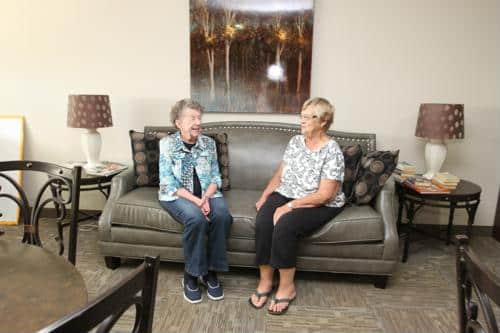
Many seniors and their families will have to deal with the realities of dementia as loved ones age. The good news is that dementia rates are on the decline in the U.S. – a 2016 study found that dementia rates in American seniors fell 24 percent from 2000 to 2012. In the year 2000, 11.6 percent of Americans aged 65 and older suffered from dementia. Today, researchers reported that the figure is down to 8.8 percent, a significant statistical decline. The average age of diagnosis has gone up, too, demonstrating that seniors are developing dementia at later stages in life. In 2000, the average age of diagnosis was 80.7; by 2012, the average age of onset had increased to 82.4. These studies consistently show that dementia rates can and are changing, improving the lives of seniors.
Furthermore, studies show that early diagnosis can improve treatment outcomes. In other words, the sooner seniors, family members, and medical professionals notice symptoms, the better. Here are the early signs of dementia. If you notice any of these symptoms in yourself or a loved one, contact a doctor as soon as possible.
Find Senior Living Near Me
Short-Term Memory Issues
Perhaps the most well-known sign of dementia, those experiencing a cognitive decline often suffer from short-term memory loss. Symptoms include trouble remembering what a senior wore the day before, when they last went grocery shopping, or misplacing familiar items.
Losing one’s keys occasionally may be common at all ages, but when someone frequently misplaces common possessions or can’t remember why they entered a room, it’s cause for concern. Dementia presents itself in loss of short-term memory rather than long-term memories. It’s far easier for a dementia patient to remember an event from 20 years ago, so don’t brush off what may be seen as minor memory loss over mundane daily activities.
Confusion
Entering a room without being able to recall why someone has gone from the kitchen to the living room is not only inconvenient—it can also cause confusion and emotional distress. These upsetting bouts of confusion can escalate when someone cannot remember the faces or names of those they’re interacting with or forget plans with family members that have been set in advance.
If you notice yourself or your loved one feeling confused or experiencing emotional distress when they become lost in conversation or social settings, it’s time to go to the doctor.
Verbal Struggles
“Symptoms of verbal issues include having trouble finding the right words for a situation.”
Those with dementia often struggle to communicate. Symptoms of verbal issues include having trouble finding the right words for a situation, lagging in conversations, or drifting off mid-sentence in an effort to find a way back to the point they’re trying to make. This can cause frustration for both the person suffering from dementia and those with whom they’re communicating.
If a family member begins feeling like their loved one isn’t communicating at the same level they used to, or if their vocabulary declines, this may be a sign of a cognitive slide.
Repetition
Another symptom of dementia is repetition. Seniors with dementia, in both early and more developed stages, often repeat questions that have already been answered or repeat statements that have already been made clear.
Dementia sufferers may also begin repeating common activities such as bathing or buying multiple common items. For example, a patient with dementia may inadvertently stock up on items such as paper towels, aluminum foil, soap, or other things they purchased at their local pharmacy, forgetting they purchased these items the day before.
Struggling to Follow Plotlines
“Intricate storylines may become challenging to understand.”
Those with dementia often have difficulties following storylines both in media and conversation. When a family member tries to tell the senior in their life a story about a vacation, an event at work, or a grandchild’s achievement at school, this may lead to signs of dementia revealing themselves.
Similarly, those with dementia may stop reading due to an inability to follow complex plots, or exhibit confusion while watching movies or TV shows. Intricate storylines may become challenging to understand, especially as someone with dementia experiences difficulty remembering the meanings of certain words. Short-term memory loss prevents those with dementia from following movies or shows, as they have forgotten what happened in the previous scene.
If you or a family member notice any of these symptoms, don’t wait to seek medical advice. Modern developments in dementia treatment can help prevent or delay further decline, improving brain health through the use of medication. In addition, medical professionals can help families develop plans to prevent wandering, depression, and injury among those with dementia. When caught early, seniors can also involve themselves in contingency plans that may include moving into a memory care community where they can receive 24-hour care in a secure environment that makes them feel safe.
Doctors, nurses, and therapists are available in memory care communities and have experience treating dementia. By socializing and, as dementia advances, increasing monitoring to stop wandering or other activities that put seniors at risk, those with dementia may be able to live happier lives in the care of professionals.




